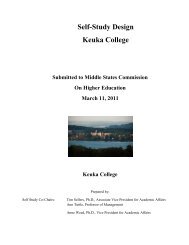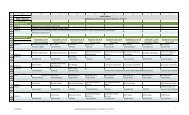final version of the self-study document - Keuka College's Middle ...
final version of the self-study document - Keuka College's Middle ...
final version of the self-study document - Keuka College's Middle ...
You also want an ePaper? Increase the reach of your titles
YUMPU automatically turns print PDFs into web optimized ePapers that Google loves.
Presentation 47 39.2%<br />
Case Study 17 14.2%<br />
Term Project 68 56.7%<br />
Group Work 23 19.2%<br />
O<strong>the</strong>r 54 45.0%<br />
Note: “O<strong>the</strong>r” types <strong>of</strong> assessment included sketchbook, community event attendance, learning journal, critiques,<br />
forum discussion, book analysis, experiential component, milestones, peer review, lab exams, tri-wall creation, band<br />
performances, literacy instruction, use <strong>of</strong> s<strong>of</strong>tware apps.<br />
The review <strong>of</strong> syllabi revealed an important trend, namely that <strong>the</strong> faculty have made <strong>the</strong>ir<br />
syllabi more learning-centered by routinely including course goals and objectives, a significant<br />
change from <strong>the</strong> time <strong>of</strong> <strong>the</strong> last syllabi review in 2002. This improvement has been driven, in<br />
part, by <strong>the</strong> inclusion <strong>of</strong> Syllabus Guidelines in <strong>the</strong> Faculty Handbook which specifies <strong>the</strong> need<br />
for course objectives, and reinforced more recently (beginning with <strong>the</strong> Spring 2010 Semester)<br />
by <strong>the</strong> Vice President for Academic Affairs who requests that faculty submit each semester a<br />
Course Syllabus Checklist to accompany all syllabi maintained in <strong>the</strong> Office <strong>of</strong> Academic<br />
Affairs. For <strong>the</strong> ASAP Program, 99% <strong>of</strong> <strong>the</strong> syllabi provide course outcome goals, and 31% have<br />
program outcome goals. For <strong>the</strong> Traditional Fall 2010 Program, 96% <strong>of</strong> <strong>the</strong> syllabi identified<br />
course outcome goals, and only 10% listed program outcome goals. For <strong>the</strong> Traditional Spring<br />
2011 Program, however, 91% <strong>of</strong> <strong>the</strong> syllabi listed course outcome goals, and 61% listed program<br />
outcome goals. In addition to delineating <strong>the</strong> need for course objectives to be aligned with<br />
student learning goals and program outcomes, <strong>the</strong> Course Syllabus Checklist also provides<br />
faculty with best practice information for syllabi development (e.g., utilizing our Learning<br />
Management System, Moodle).<br />
A review <strong>of</strong> course syllabi for accelerated courses in <strong>the</strong> Accelerated Studies for Adults Program<br />
(ASAP) showed that <strong>the</strong>y also provide instructional equivalences to comply with <strong>the</strong> credit hour<br />
requirements.<br />
Student learning goals are available to prospective students via <strong>the</strong> <strong>Keuka</strong> website and various<br />
handbooks (e.g., Student Handbook, ASAP Graduate Handbook, ASAP Undergraduate<br />
Handbook). Those programs requiring specialized outside accreditation usually contain a more<br />
thorough description <strong>of</strong> program outcomes (e.g., Occupational Therapy, Nursing, Social Work).<br />
Whereas <strong>the</strong> syllabi review provides direct evidence <strong>of</strong> rigorous student learning goals, student<br />
survey information provides indirect evidence <strong>of</strong> rigor. As a means <strong>of</strong> acquiring student<br />
opinions <strong>of</strong> <strong>the</strong>ir education experience, <strong>the</strong> following most recent surveys were examined: 2012<br />
National Survey <strong>of</strong> Student Engagement (NSSE), and <strong>the</strong> 2009 Recent Graduate Survey. The<br />
Recent Graduate Survey results indicated that 86% <strong>of</strong> <strong>the</strong> graduates believed that <strong>the</strong> College’s<br />
experiential Field Period requirement was helpful for <strong>the</strong>ir career development. In addition, only<br />
2% <strong>of</strong> <strong>the</strong> students surveyed indicated that <strong>the</strong>y were not prepared for <strong>the</strong> job search process.<br />
This result suggests that <strong>the</strong> students have mastered <strong>the</strong> higher levels <strong>of</strong> learning (analysis,<br />
Page 18 <strong>of</strong> 39 Chapter 6: Faculty, Ed Offerings & GenEd




